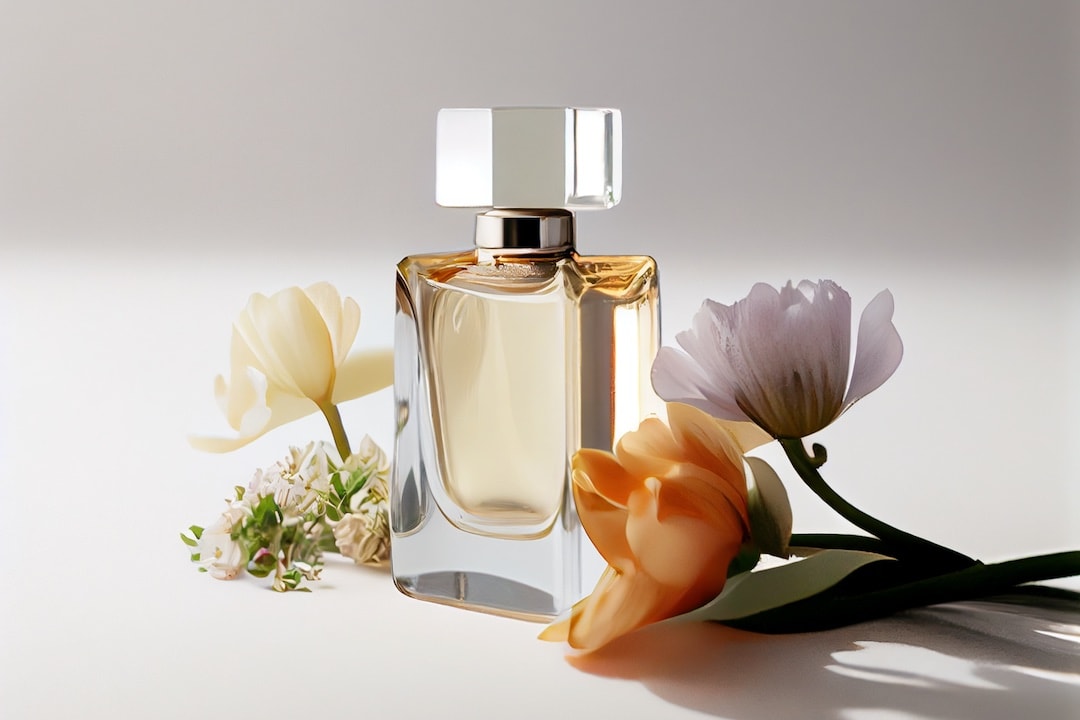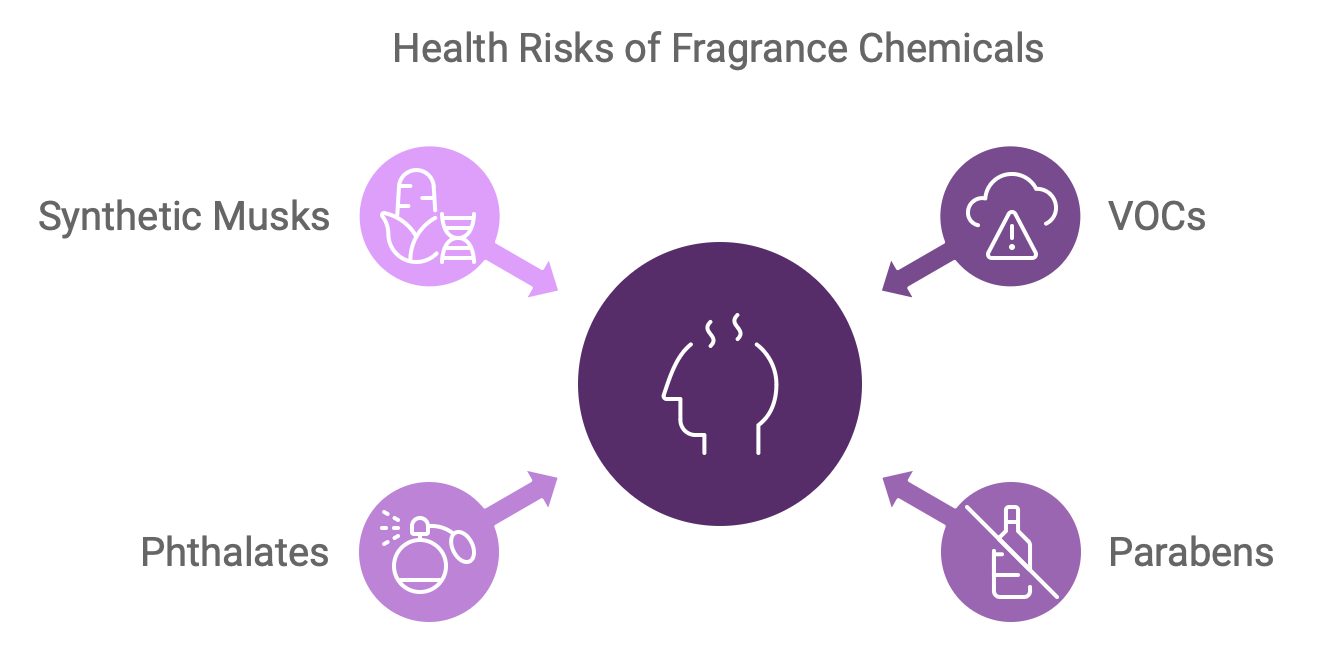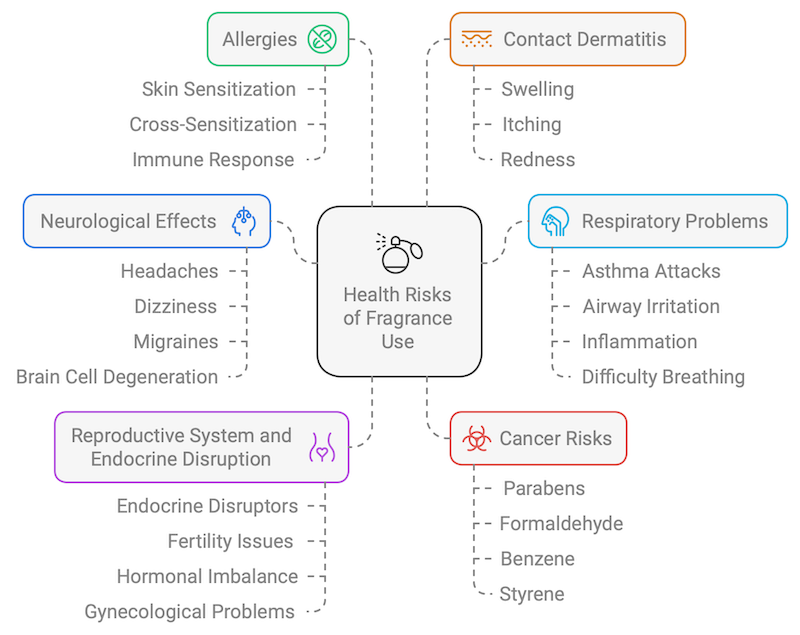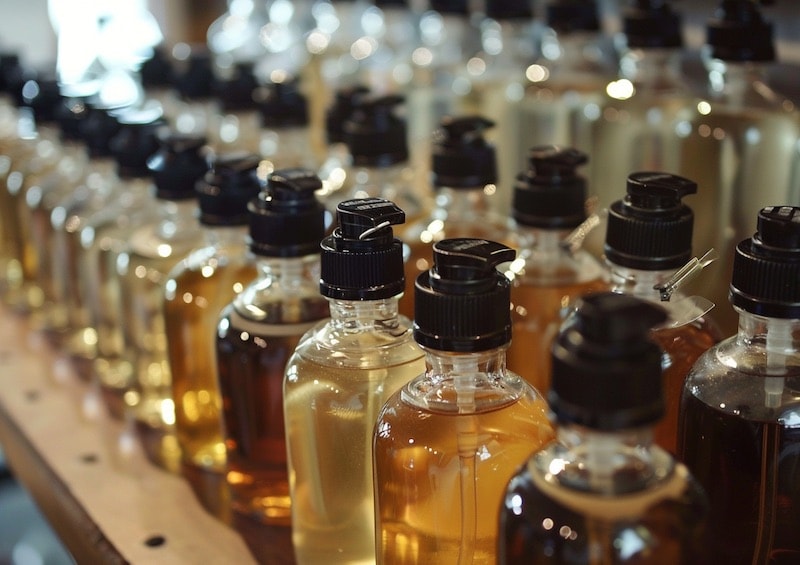Table of Contents
Why is Fragrance Bad? Health Risks and Safe Alternatives
This page may contain affiliate links. We may earn a commission on purchases, at no additional cost to you. Learn more →
Have you ever wondered if the fragrance you’re wearing every day might be bad for you? I thought I was doing everything right by choosing products that smelled good and made me feel confident.
But the deeper I reaserached into the ingredients in perfumes and scented personal care products, the more I realized that many fragrances contain harmful chemicals that are anything but harmless. If you’re curious (or maybe even a bit concerned, like I was), you’re in the right place.
In this article, we’ll explore why fragrance is bad for you, the effects of inhaling perfumes, and what healthier, non-toxic swaps are available for you to embrace a cleaner and safer way of smelling good.
What is Fragrance?
Fragrance is an umbrella term used to describe a hidden mix of thousands of untested, potentially harmful chemicals. The fragrance industry use ‘fragrance’ as a loophole to avoid listing individual ingredients, keeping their trade secrets. According to the International Fragrance Association (IFRA), over 3,500 fragrance chemical compounds are used in everyday personal care products, from your favourite shampoo to household air fresheners, without full transparency.

Does smelling good come at a cost?
Have you ever wondered what ‘fragrance’ really means? Fragrance chemicals can either be natural or synthetic, with most fragrances used today containing hidden chemicals that are synthetic.
Fragrance ingredients can mask unpleasant odors, however, their attractive scents can be deceiving.
In 2004, the average adult used about 12 personal care products a day that contained fragrances, from shampoos to cleansers, with even more fragranced consumer products on the store shelves today, that number has only risen.
Why is Fragrance Bad?
Natural fragrance typical contains two components: aromatic compounds and musk, derived from various plant parts. Synthetic fragrances, on the hand are a whole different story, packed with a cocktail of synthetic chemicals, here’s to name a few of the most common which are detrimental to human health due to their toxic effects.
Fragrance Chemicals and Health Risks
-
Volatile organic compounds (VOCs) like acetaldehydes, ethanol, acetone, limonene, beta-pinene, and alpha-pinene
-
Parabens (e.g., methyl, prophyl butyl and ethyl paraben) that act as preservatives in perfumes, shampoos, deodorants, and cosmetics but are used as fungicides and bactericides.
-
Phthalates, the most common being diethyl phthalate (DEP) and dibutyl phthalate (DBP) that are chemicals used to make perfumes last longer
-
Synthetic musk's, which mimic natural hormones, disrupting normal endocrine and biological processes.

Fragrance Ingredients: A Closer Look
Cosmetic products like perfume and cologne or ''eau de parfum" or "eau de cologne', though popular, can pose some adverse health effects. Shockingly, a survey found that 70.9% of perfume users had no idea that their perfumes could harm them, and had no idea that most perfumes were considered toxic substances. But what does really hide inside of perfume bottle? I don't´think you will like the answer
Health Effects of Fragrance Exposure
Fragrance chemicals can enter the body through, inhalation, skin absorption, and even ingestion, making their way into the bloodstream. Once inside the toxic chemicals can cause a multitude of toxic adverse effects, disrupting various systems and organs.
Here are some of the adverse health effects associated with fragrance...
Neurological affects:
Even your most fine fragrances can affect the central nervous system and brain, some of which are immediate, whilst others are longer-term. Inhalation exposure to potentially harmful ingredients are detected by receptors in the mouth, nose, and eyes. Since the olfactory receptors are directly connected to the brain, there is no surprise that these toxic chemicals can affect your brain.
Interestingly, while we can detect perfume at low levels, after some time, our sense of smell dulls, which often leads to us over-applying fragrance to the desired amount.
In the short term, headaches, dizziness and migraines are a common side effect of fragrance use. However, more alarmingly…
-
Animal studies have linked fragrance products called p-cymene, a fragrance chemical to weakness, headaches and reduced neurological pathways in the brain
-
Synthetic musks like galaxolide, and tonalide, have been associated with brain cell degeneration, potentially increasing the risk of diseases like Parkinson’s disease
Respiratory problems
As fragrance enters the airway through inhalation exposure, individuals with asthma face heightened risks, as exposure to some fragrances can induce severe reactions – even at low concentrations. For many, just a whiff of a scented air freshener can spark an asthma attack.
Not only asthma sufferers should be concerned, as once these toxic ingredients are in the respiratory tract they can cause a cascade of toxic effects, inducing airway irritation, inflammation, coughing and even difficulty breathing.
The Reproductive System and Endocrine Disruption
Are fragrance mixtures silently harming your reproductive health? Alarmingly, there is increasing evidence that suggests the toxic chemicals in fragrances are endocrine disrupters, effecting the reproductive system, and even fertility.
In one study, 17 fragrances were found to contain an average of four endocrine disrupting chemicals – most notably being synthetic musks and DEP. Synthetic fragrance musks can mimic natural hormones, messing with the body’s natural balance and disrupting the endocrine system , which may a critical role in fertility and reproductive health.
Phalatates like DEP have been associated with abnormal male reproductive development in infant boys, and sperm damage in adult men. However, even more alarmingly, high levels of musk ketone and musk xylene have been linked to gynecological issues like infertility and ovarian failure in women.
Fragrance Chemicals and Cancer: Carcinogens
It is not so much of a mystery that fragrance harbors hidden carcinogens. Yes this meants that perfume can cause cancer, and no the perfume industry do not want you to know this..
For instance, parabens, multiple studies have strongly linked these chemicals to breast cancer.
Unfortunately, parabens are not the only offenders, formaldehyde, benzene and styrene, found in many scented products have been found to be linked with cancer risk.
In 2010, a study conducted by Environmental Working Group (EWG) found 14 out of 17 popular perfumes at that time contained carcinogens.
Fragrance and Allergies
Did you know that… Fragrance allergies impact up to 11% of the global population, affecting millions of people. Fragrance can sensitize on the skin, meaning repeated exposure can cause someone to develop a fragrance allergy. Cross-sensitization can also occur, where a person becomes has an allergic reactions to different substance after initial exposure.
Once sensitized, avoiding the allergen is crucial, as further exposure can lead to worsened reactions to the fragrance, causing an immune response, and severe allergies like a contact allergy called contact dermatitis – a skin condition causing swelling, itching and redness.
Allergic Contact Dermatitis
Fragrances are a leading cause of cosmetic contact dermatitis, according to the American Academy of Dermatology.
Studies on children aged 5-15 show that the common allergic reactions are to parabens (43%), potassium dichromate, an agent used in tanning and painting (27%), and perfume (26%). Despite the risks, only 26 out of the 82 known fragrance allergens identified by the European Union’s Scientific Committee on Consumer Safety are required to be listed on product labels, including toxic chemicals like eugenol, citral and cinnamal.

The Impact of Fragrance on the Environment
Fragrance is everywhere these days, including the world around us, with fragrance containing products emitting over 10 volatile organic compounds (VOCs) into the air, affecting public health.
Volatile organic compounds are a significant source of air quality issues. In fact, a recent study, revealed that personal care and household products contribute significantly to the VOCs emission that harm the atmosphere. What’s more, these toxic chemical compounds do not vanish, they are absorbed by the ocean, soil, and greenery which surrounds us.
Fragrance consumer products, are often a primary source of indoor air pollutants, and are implacited as major contributors to outdoor air pollution. According to a new study, volatile organic compounds present in personal care and household products leads to substantial emissions of volatile organic compounds to the atmosphere, contributing half of the VOCs that cause air pollution. These volatile toxic chemicals have been shown to be taken up from the air by plants.
Another issue with fragrances being used in most laundry detergents and cleaners, is that these wash down our drains, accumulating in our reviews and sewers. Unfortunately, current water treatment techniques cannot effectively remove these compounds well, causing build-up in aquatic ecosystems. When in water these chemicals are referred to as ‘persistent organic pollutants’, these toxic chemicals can be deadly to wildlife, and in turn disrupt the food chain.
Regulation of Fragrance Ingredients and Safety Issues
Fragrance manufacturers and the cosmetic companies are not legally required to disclose their ingredients, often claiming their formulas are confidential, maintaining their trade secrets. Terms like ‘fragrance’ is ‘perfume’ or ‘parfum’ often mask a mixture of undisclosed chemicals, leaving consumers and professionals in the dark about the potential health implications and their influence as air pollutants. Interestingly, these regulations differ by countries. Countries including the US, Europe and Canada, use the IFRA and the Research Institute for Fragrance Materials (RIFM) to get advice on the safety standards when it comes to fragrance regulations.
Up until now, the European Union currently has banned over 2,500 fragrance ingredients, whilst in the US, the FDA only has banned 11. This discrepancy is largely due to the FDA not reviewing fragrances before they hit the market.
Minimizing Exposure to Fragrance
The first step in reducing exposure to harmful fragrance chemicals is learning to read labls, and spot safe cosmetic products. Thankfully, there are several ingredient checker apps that can help you do just that, just by scanning the barcode, you can decode how potentially harmful the product. This is the first step in identifying clean beauty products. You can refer to our clean beauty guide to better understand which products are truly safe.
Here are some quick tips
-
Avoid products that list “fragrance” in the ingredients
-
Look for products with the EWG VERIFIED stamp, they prioritise consumer safety and ensure personal care products they strict health standards
-
Enhance your home’s air quality with houseplants, natural ventilation, or air purifiers
Can you trust natural fragrances or organic products?
Not necessarily. Even personal care products labeled organic’ or ‘natural’, can still contain synthetic substances.

Alternatives to Conventional Fragrance
When seeking “Fragrance-free” options, remember that “unscented” fragranced products often still contain fragrance materials to mask unpleasant smells.
True fragrance-free products, although limited, often the same functionality without the health risks. Have faith there are options, once you familiarized with trusted brands, living a ‘fragrance-free’ and by default, a more sustainable lifestyle will feel more natural.
Essential oils as an alternative
Essential oils can still mask an unpleasant odor, providing a natural scent, and some contain antibacterial properties, a little goes a long way. However, be cautious with their use, always use oils with water or carrier substances to reduce their concentration and discontinue use if you experience headaches or skin irritation. Bone points if you choose essential oils which have been sustainably harvested.
Raising awareness of the dangers of fragrance
Don’t worry, Advocacy groups including the Campaign for Safe Cosmetics and the Environmental working group are working tirelessly to push for safer formulations, stricter regulations from cosmetic companies and complete ingredient disclosure.
Key takeaways
• Fragrances are composed of thousands of hidden, often toxic chemicals that are not fully disclosed on product labels.
• Common harmful ingredients in perfumes include phthalates, parabens, BHT, synthetic musks, and styrene, which can cause health issues such as hormone disruption, respiratory problems, and cancer.
• Perfumes and scented personal care products can cause long-term health effects, including endocrine disruption and an increased risk of cancer.
• Non-toxic perfumes are made with natural ingredients, avoiding harmful chemicals, making them a safer alternative for your health and the environment.
• Opting for fragrance-free or natural non-toxic products reduces your exposure to harmful chemicals, benefiting your overall health and minimizing environmental impact.
Fragrances in everyday personal care and household products can negatively impact your health. By making simple swaps for fragrance-free personal care products or using natural fragrance, you can avoid hidden toxins, and be more environmentally conscious—a win-win!

If you enjoyed this post, check out these other articles on safe products and non-toxic living:
How to Make Natural Perfume at Home: Your Guide to Non-Toxic, DIY Fragrance
FAQ
What Happens if You Inhale Perfume?
When you inhale perfume, you are exposed to fragrance chemicals, including VOCs, which can enter the body through inhalation, skin absorption, or ingestion. These compounds are absorbed by olfactory receptors that are directly connected to the brain, leading to immediate and potentially adverse effects. Common symptoms from inhaling perfume include headaches, dizziness, and respiratory issues, particularly for individuals with asthma or allergies.Moreover, perfumes often contain endocrine disruptors and other toxic ingredients that can linger in the bloodstream. These substances may impact the nervous system and other bodily functions over time. The presence of VOCs in perfumes is well-documented, and they can trigger various health issues such as respiratory problems (e.g., difficulty breathing, coughing), allergic reactions, and migraine headaches.
Can perfume damage lungs?
Yes, perfume can potentially damage your lungs, especially if you have underlying respiratory conditions like asthma. Perfumes often contain volatile organic compounds (VOCs), which can irritate the airways and exacerbate symptoms such as coughing, wheezing, and asthma attacks. While VOCs from natural sources like forests can have beneficial effects, synthetic VOCs in perfumes may pose health risks
Why you shouldn’t use products with fragrance?
Fragrances in products often contain a mix of chemicals that are not always disclosed or regulated. These chemicals can cause skin irritation and disrupt hormones. Some studies suggest that certain fragrance compounds may be linked to more severe health issues, including cancer, although this is still a subject of ongoing research. Opting for fragrance-free or non-toxic alternatives can be a safer choice
Why is fragrance so bad in skincare?
Fragrances in skincare products can lead to skin irritation and allergic reactions. They may also exacerbate existing skin conditions such as eczema. Additionally, some fragrance ingredients are known to disrupt hormones, making them unsuitable for regular use on the skin
Is it bad to wear fragrance?
Wearing fragrance can be harmful due to the presence of potentially toxic chemicals in many perfumes. These substances can be absorbed through the skin or inhaled, leading to health issues such as headaches, dizziness, hormone disruption, and an increased risk of cancer. It is advisable to choose perfumes that clearly label their ingredients and avoid harmful chemicals
Should I avoid products with BHT?
Yes, it is generally advisable to avoid products containing BHT (Butylated Hydroxytoluene), as it is a synthetic antioxidant linked to hormone disruption and other health risks. Natural preservatives are often recommended as safer alternatives
Is styrene in perfume?
Styrene is found in some perfumes and is classified as a possible human carcinogen. Its presence can increase cancer risk, so it is important to choose products that clearly label their ingredients and avoid those containing styrene.
1 comment
Hi
Thanks for the in-depth information in your article.
Can you suggest some perfume brands [both for men and women] that have the lowest amount of harmful chemicals?!
Regards













